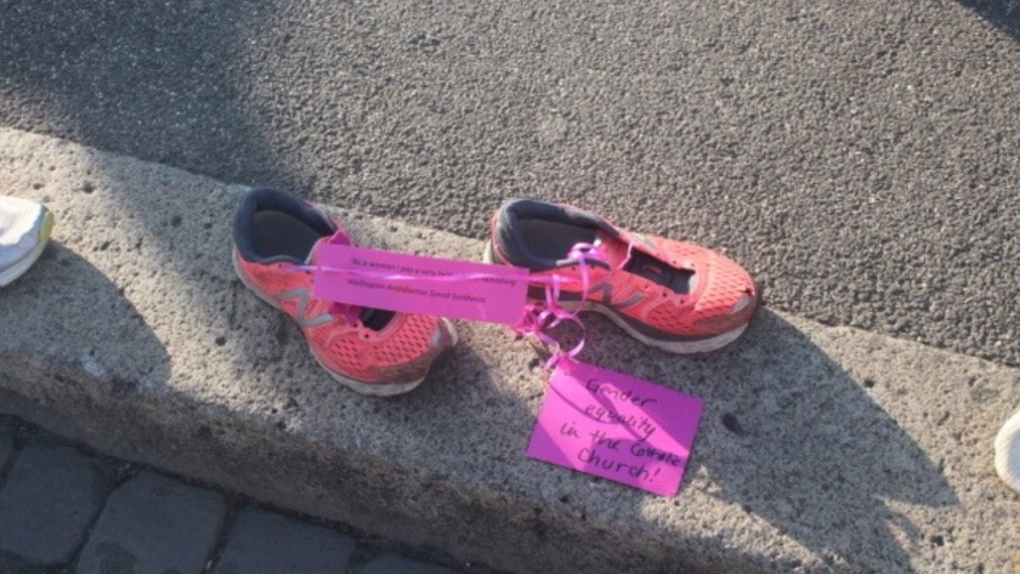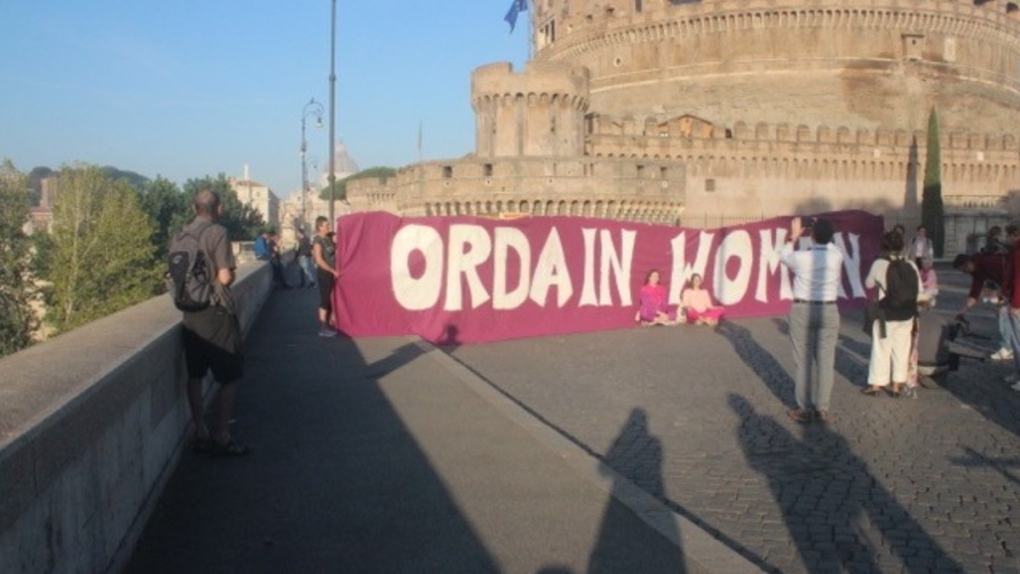
'I am angry': Alberta farmers will continue fight over world class motorsport resort
The rolling hills leading to the hamlet of Rosebud are dotted with sprawling farms and cattle pastures -- and a sign sporting a simple message: No Race Track.
A global gathering of bishops and laypeople is underway in Vatican City, as Pope Francis holds a nearly month-long meeting that will help the church chart its future course.
The 'Synod on Synodality,' as it's officially called, could unfold as a key event in Francis' decade-long reign.
The discussions will highlight some hot-button issues, putting everything on the table for delegates to discuss. Topics include women deacons, priestly celibacy and 2SLGBTQ+ outreach.
Pope Francis said the Catholic Church must rebuild to make it a place of welcome for "everyone, everyone, everyone," as he opened the Synod that has sparked hope among progressives and alarm among conservatives.
Already this week the Pope has given signs the church is open to liberalization, suggesting there could be ways to bless same-sex unions, as long as such benedictions aren't confused with sacramental marriage.
For the first time ever, laypeople including women can attend and vote. That historical accomplishment alone is enough to encourage women who belong to the Catholic Church, but it's the possibility of allowing women into priesthood that took passionate groups from around the world to the steps of the Vatican.
"Looking out over Rome and seeing these ancient basilicas and the city of Rome – people all over the world doing what they're doing in an evening and realizing that I'm in a very historic place. And it hit me that something very historic is happening with this synod," said Mary Ellen Chown, member of the Catholic Network for Women's Equality (CNWE). The Oakville, Ont., resident is in Rome with the Canadian organization.
Some of the strongest voices in Rome at the moment are coming from outside the Synod hall – groups advocating for even more women's representation in the church.
They are women who participated at the community level, helping to set the tone for this Synod. They felt compelled to be in Rome, not as official delegates but as a reminder of what the church should represent.
"It's just really unacceptable that we're saying the majority of the church has no role in any of that or a role in the teachings of the church," said Chown.
"There are decisions made that impact women's lives and family lives, and women and families have never been a part of that decision-making, and it just needs to change," Chown added.
 Members of the Catholic Network for Women's Equality participate in prayer, vigils, conferences and action events calling for change, outside the Vatican, as Synod gets underway. For the first time, laypeople, including women, can attend and vote. (Catholic Network for Women's Equality)
Members of the Catholic Network for Women's Equality participate in prayer, vigils, conferences and action events calling for change, outside the Vatican, as Synod gets underway. For the first time, laypeople, including women, can attend and vote. (Catholic Network for Women's Equality)
While in Rome, members of the CNWE will participate in various prayer vigils, conferences and other events to help bring their message around women's ordination and voting rights to the Vatican and those inside.
"It's important to be relevant, and in a changing world you need to change to meet the needs of your parishioners," said Louise Dowhan, a member of the CNWE.
"So it's a benefit for the church as a whole if they move forward on women's ordination and full participation in the church," Dowhan added.
The matter of women as priests has been a topic of conversation for decades. But with the issue on the official agenda at the Synod, and women in attendance with voting rights, it brings renewed hope for change.
"I want the church to move forward from talking to doing," said Dowhan
Reid Locklin, an associate professor of Christianity and culture at St. Michael's College, University of Toronto, says Pope Francis is trying to create structures that permit real discussion.
"There's always been a question about whether there's been a 'code' and Francis sort of removed the code and said we can talk more freely," Locklin said.
"The Pope isn't saying this is all just up for grabs," Locklin added, "but he's saying all of it is something we need to discern together. He can't dictate what the governance of the church absolutely should be. He's going to have to make some decisions but he's going to do it informed by all this work."
 Members of the Catholic Network for Women's Equality participate in prayer, vigils, conferences and action events calling for change, outside the Vatican, as Synod gets underway. For the first time, laypeople, including women, can attend and vote. (Catholic Network for Women's Equality)
Members of the Catholic Network for Women's Equality participate in prayer, vigils, conferences and action events calling for change, outside the Vatican, as Synod gets underway. For the first time, laypeople, including women, can attend and vote. (Catholic Network for Women's Equality)
As more and more pews sit empty, many Catholics say the church has no choice but to modernize. Setting a new path for this institution and others to follow.
"The fact that they can treat women like second-class citizens in their own organization to me sends a message to other societies and organizations or religions," said Dowhan, a message this group hopes will change.
Many are calling on the church to be accountable with women, sexual abuse scandals and its legacy in Canada's residential school system.
Chown says the church has had a "credibility problem for a long time" on these issues.
"We're going to need structural change urgently. I just think with the problems of the world too we can't wait to be a huge institution that can model equality and inclusion and justice," she added.
The Roman Catholic Church is a global institution, but its reputation is not always one for others to model.
"It has status at the United Nations and here we have a United Nations declaration of human rights of equality for women, and yet our church participating in that doesn't model that," said Chown.
"A central part of Catholic teaching is belief in the inherent equality of every person and so it just doesn't follow that if that is a central part of our teaching that we don't look and say gifted and qualified women can be in the church as ordained ministers."
Experts say rarely in recent times has a Vatican gathering generated as much hope, hype and fear as this Synod, but it's the hope that many are holding on to.
"We want women to be included, but we want gender equality. We want a greater sensitivity to understanding gender in a more contemporary way in the church," said Chown.
"We want an understanding of mercy and kindness, and welcoming and compassion, instead of what the church has sometimes seemed as a place of judgement."
There won't be any binding decisions at this meeting – it's only the first session of a two-year process.
The second Synod will take place in October 2024.

The rolling hills leading to the hamlet of Rosebud are dotted with sprawling farms and cattle pastures -- and a sign sporting a simple message: No Race Track.
Dozens of Ontarians are expressing frustration in the province’s health-care system after their family doctors either dropped them as patients or threatened to after they sought urgent care elsewhere.
For decades, North Bay, Ontario's water supply has harboured chemicals associated with liver and developmental issues, cancer and complications with pregnancy. It's far from the only city with that problem.
A man who tried to access Drake’s Bridle Path mansion earlier this week returned to the property Saturday and was apprehended again for allegedly trespassing, Toronto police say.
Multiple people at the protest camp torn down at the University of Alberta campus Saturday say police's actions against protesters were "violent" and "disproportionate."
When West Virginia Republicans vote in Tuesday's primary, they will have a hard time finding a major candidate on the ballot in any statewide race who openly acknowledges that U.S. President Joe Biden won the 2020 election.
Amazon's paid subscription service provides free delivery for online shopping across Canada except for remote locations, the company said in an email. While customers in Iqaluit qualify for the offer, all other communities in Nunavut are excluded.
Two daughters and a mother were reunited online 40 years later thanks to a DNA kit and a Zoom connection despite living on three separate continents and speaking different languages.
U.S. President Joe Biden on Saturday called Donald Trump “clearly unhinged” and claimed that “something snapped” in the former president after he lost the 2020 election.

A family of fifth generation farmers from Ituna, Sask. are trying to find answers after discovering several strange objects lying on their land.
A Listowel, Ont. man, drafted by the Hamilton Tigercats last week, is also getting looks from the NFL, despite only playing 27 games of football in his life.
The threat of zebra mussels has prompted the federal government to temporarily ban watercraft from a Manitoba lake popular with tourists.
A small Ajax dessert shop that recently received a glowing review from celebrity food critic Keith Lee is being forced to move after a zoning complaint was made following the social media influencer’s visit last month.
The Canada Science and Technology Museum is inviting visitors to explore their poop. A new exhibition opens at the Ottawa museum on Friday called, 'Oh Crap! Rethinking human waste.'
The Regina Police Service says it is the first in Saskatchewan and possibly Canada to implement new technology in its detention facility that will offer real-time monitoring of detainees’ vital health metrics.
Just as she had feared, a restaurant owner from eastern Quebec who visited Montreal had her SUV stolen, but says it was all thanks to the kindness of strangers on the internet — not the police — that she got it back.
The stakes have been set for a bet between Vancouver and Edmonton's mayors on who will win Round 2 of the Stanley Cup playoffs.
A grieving mother is hosting a helmet drive in the hopes of protecting children on Manitoba First Nations from a similar tragedy that killed her daughter.